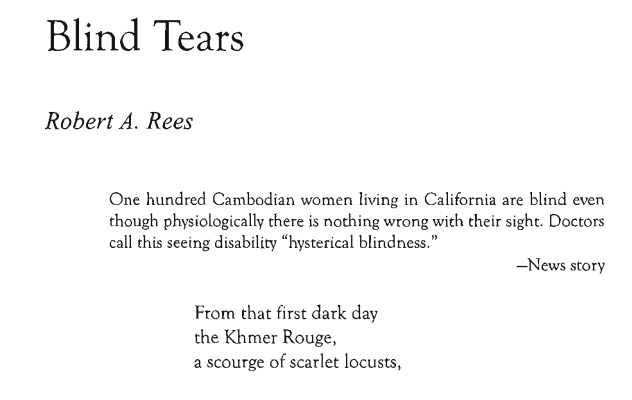Articles/Essays – Volume 37, No. 3
Blind Tears
One hundred Cambodian women living in California are blind even though physiologically there is nothing wrong with their sight. Doctors call this seeing disability “hysterical blindness.”
—News story
From that first dark day
the Khmer Rouge,
a scourge of scarlet locusts,
drove us like cattle
into the countryside.
The rivers ran red,
the bodies of my people
floating like dead fish
on the water. The sky
was the color of dried wounds
as rice fields yielded their corpses
from shallow graves,
their clouded eyes blind
to the harvest of dark blisters
ripening on the killing fields.
For many months I prayed
to Buddha to give me death,
to bind my eyes with darkness
that I would see no more,
but my body was filled with eyes
and I could not escape seeing.
There was never enough food.
When I saw my children’s eyes,
watery as our thin rice broth,
I traded diamonds for milk,
a gold bracelet for one sweet potato,
and my wedding ring for a cup of rice.
My children caught frogs
along the river bank
and tiny green locusts in trees.
We ate red ants, rats,
roots, leaves, and bitter bark.
Water lily stalks were a delicacy.
When at night my husband
stole carrots and cabbage
from the village garden
the soldiers beat him with sticks
and threw him bound into a fire.
I tried to cover my children’s eyes,
but the soldiers forced us
to watch and a black mist
began to rise before me.
As my children grew thinner,
their cries invaded my sleep
and I awoke in their ravening dreams.
I dug worms and dung beetles,
boiled leaves for tea and
gave my body to the village leader
for one sack of rice. All this I
could see until the woman in the
next hut kept her baby when it died
then she too ate like the crows and
wolves, like the vultures that circled
all day in the darkening sky.
When my sister went blind
they accused her of deception
and tied her in a graveyard
where ghosts cried all night long,
weeping for their lost ones
under a blood-red moon.
When she saw our grandmother’s ghost
and cried out, they killed her with a
pickaxe and left her with no stone.
One by one, all my little ones
perished before my sight. Some died
of starvation and others of dysentery.
I tried to do koktchai for each one,
to send them on to the next world
in the proper way, but even this
was forbidden. My son who was
impaled on spears of bamboo
for stealing an extra bowl of soup
and my little granddaughter
whom the soldiers beat against
a tamarind tree.
I buried them all—
at Viel Trumph, and Prey Veng,
at Battambang and all along the Mekong.
When I became too weak to work
in the fields, they put me in charge
of digging children’s graves.
I dug each one slowly, for I could
barely see by now, spooning the
dark earth tenderly, then
wrapping the small bodies
in whatever I could find, sometimes
only paper or leaves,
and laying them in the ground.
At the end, my sight completely gone,
I did all this by touch,
feeling for the softest ground,
making sure the children’s eyes
were closed, and then covering them
with earth. Although it was forbidden,
for some 1 placed a flower or planted
a seed, and once or twice I even
rocked them for a few moments
and kissed them goodbye
before 1 laid them softly down.


 Back to full Issue
Back to full Issue

